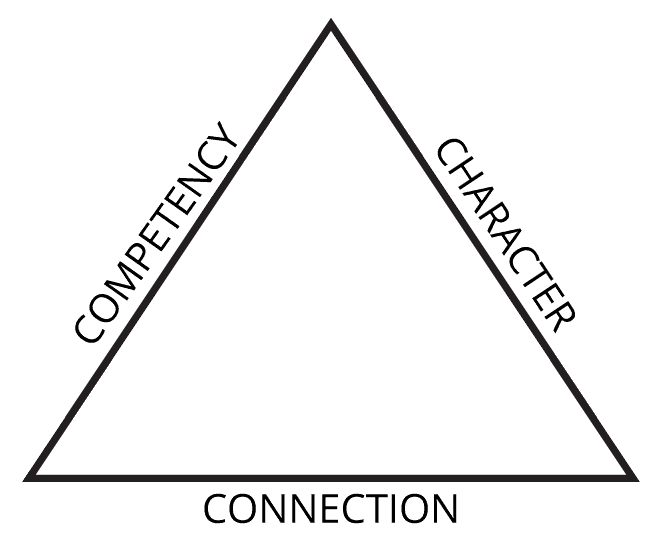Ah trust….
As I wrote about in my prior essay “About Humans 101,” the trust thing has been an issue for humans for tens of thousands of years and, while I didn’t write about this specifically, I’m pretty sure research will corroborate the idea that trust has been an issue with living creatures for millions of years. Even the Dickinsonia, a prehistoric animal that researchers say lived 558 million years ago and could grow to more than four feet in length, had to deal with trust on some level.
How Important is Trust?
There’s tons of research supporting the notion we’re social creatures and, I’ll submit it’s pretty hard to be social without trust. If you’ll grant me we’re social creatures, trust is probably the most valuable asset we hold as a person, a group, a tribe, a company, a community, a state, a nation. Trust is… “almost everything.”

I’d be shocked if less than 90% (I’m fond of the number 90) of the readers of this essay don’t believe we live in a world with major trust issues. That said, I suspect we, especially leaders, may not get this as deeply as we need to (it’s all the other group’s fault, right?). I’m also pretty sure that The Age of Information (what I refer to as “Work 7.0” in my upcoming book, Work 9.0) has made it easier for us to more clearly see ourselves through our trust lenses (we’ll get into these in detail in Part Two) and the reason we have so much social discord is we just don’t like what we see.
Generally speaking, most of us aren’t big fans of lying, cheating, hypocrisy, double standards, hoarding, disinformation, misdirection, bad behaviors and people / groups acting in bad faith — especially when done by those we think of as “other tribes.”
We no longer collectively trust the institutions we have relied on for so long. As an example, in the United States, many don’t trust our:
- President
- Congress
- Senate
- Federal government
- State governments
- Local governments
- Schools
- Universities
- Educators
- Big corporations
- Media
- Pollsters
- Other traditional sources of information
- Unions
- History
- Sciences
- Scientists
- Charities
- Institutional religions, and
- Global organizations, like the World Health Organization and / or the United Nations.
You may be biased toward a member or a defender of one or more of these groups, but hopefully you’ll grant me that millions of people have trust issues with every single one of them. Ugh, right? If you want some proof check out some of these recent Gallup surveys:
“Americans Remain Distrustful of Mass Media”
“U.S. Satisfaction Sinks with Many Aspects of Public Life”
“U.S. Satisfaction at 11% in Early January”
Fact is, we’ve got a huge trust issue and we’re ignoring it. It’s almost as if we are in ancient Roman times and the powers that be (left, right and center) are saying, “We know we have big issues but let’s just hold a series of games and distract the people, the masses, from our realities.” It’s bizarre if you stand way back and look at it.
An Optimistic Light Shines Ahead
All this being said, I’m very optimistic longer term. We know what trust is. Making it easier to see, understand, measure and build is the primary objective of this series of essays.
We also know each of us can make a difference. We can push for higher standards. We can start to reverse this trend by working on ourselves and leading by example. We can start by embracing our “better angels.” We can start by acknowledging our own faults, and approach reversing this challenge with humility and grace.
We can start by acknowledging our own faults and approach reversing this challenge with humility and grace.
We can start by endeavoring to be a better and better version of ourselves. We can start by doing the right thing — not just for us but for our family, our company, our local community, our state, our nation, our world.
We can start by engaging in good faith. We can start by only making promises we genuinely intend to keep. We can start by admitting what it is we can do or don’t have the capacity to do. We can start by acknowledging our own challenges, our circumstances, our weaknesses and being more accepting those of our “others.” We can start by admitting our mistakes and acknowledging our shortcomings.
We can start by recognizing that reversing this trend will require hard work and hard Work, and patience and perseverance. We can start by accepting every one of us is imperfect and evolving. Not just the understanding that every one of us is an imperfect and evolving being, but accepting the fact that so, too, is every family, every tribe, every community, every company, every region, every country.
We can start by accepting every one of us is a bit of a mess, while at the same time appreciating how wonderful life truly can and should be, and how we are all in this together.
We can start by accepting every one of us is a bit of a mess, while at the same time appreciating how wonderful life truly can and should be, and how we are all in this together.
We can start conversations with our friends and families and within our own groups, our companies, our local communities, etc. and start to reverse this trend one person, one family, one team, one group, one community, one company, one state, one nation at a time.
The vast, vast majority of us are good people (research suggests less than 5% of us are socio- or psychopaths — not that all of them are what most people would deem bad people). We can start by respecting one another. We can start by genuinely helping and providing FeedForward (what Michael Allosso refers to as being truthful, specific and positive) to one another so we all have a decent shot at becoming better and better versions of the best versions of ourselves.
We have the insights, the tools, the competencies, the resources, the values and the disciplines required to reverse this trend and move through this time to a better tomorrow.
We have the insights, the tools, the competencies, the resources, the values and the disciplines required to reverse this trend and move through this time to a better tomorrow.
Those of us who live in the United States are blessed to have a large number of sister nations that are, like our own, political systems designed to avoid the worst outcome (i.e., the loss of our unalienable rights, as mentioned in “Being Human: 101”). The road ahead is tough. It will require hard Work and sacrifice. But we will move through this.
A final comment as I conclude Part One…
This is the hardest series of essays I’ve ever written. This series on Trust will never be finished. I’m certain I will come back time and again and refine each essay. I may even change core thoughts or points. That’s why I’ve added the words “a forever work in progress” to the title of this essay series. The reality is not only is this series a WIP but Trust is probably one of the oldest forever WIP’s of all.
Executive Summary
- Trust is probably the most valuable asset we hold as a person, a group, a tribe, a company, a community, a state and a nation.
- We’re social creatures, yet it’s very hard to be social without trust.
- We live in a world filled with individuals with trust issues, yet most of us ignore it.
- Trust is the ultimate forever work in progress.
- We have the insights, the tools, the competencies, the resources, the values and the disciplines required to reverse this trend and move through this time to a better tomorrow.
- As individuals, we are capable of taking action to reverse the trend, one person, one family, one team, one group, one community, one company, one state, one nation at a time.
Action Steps
We can start to restore trust by:
- Acknowledging our own faults and approach reversing out trust challenge with humility and grace;
- Admitting our mistakes and acknowledging our shortcomings;
- Accepting every one of us is imperfect and evolving;
- Only making promises we genuinely intend to keep;
- Working first on ourselves and leading by example;
- Focusing on becoming better and better versions of the best versions of ourselves.



